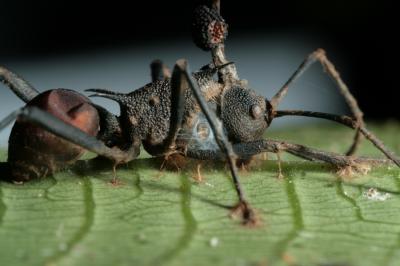Let's get this straight. There is a fungus. It attacks the brain of ants.
OK.
The fungus causes ants to march off to a mass ant grave.
Cripes.
Then the fungus spores explode out of the ants' heads.
What?!
But there's a separate parasitic fungus that 'effectively castrates' the head-exploding 'zombie-ant fungus'.
That's erm, good, right?
But what if you hate ants? Whose side are we on here?
Flame them all.
A parasite that fights the zombie-ant fungus has yielded some of its secrets to an international research team led by David Hughes of Penn State University. The research reveals, for the first time, how an entire ant colony is able to survive infestations by the zombie-ant fungus, which invades an ant's brain and causes it to march to its death at a mass grave near the ant colony, where the fungus spores erupt out of the ant's head.
"In a case where biology is stranger than fiction, the parasite of the zombie-ant fungus is itself a fungus — a hyperparasitic fungus that specializes in attacking the parasite that turns the ants into zombies," Hughes said. The research will be published in the journal PLoS ONE.
Because the hyperparasitic fungi prevents the infected zombie-ant fungus from spreading spores, fewer of the ants will become zombies.
Scientists previously had known that ants defend their colonies against microscopic enemies such as fungal spores by efficiently grooming each other. In this study, the researchers also modeled the effect of ant behavior on limiting infection.

"Interestingly, beyond the well known effect of defensive ant behavior, our new research reveals the added effect of the castrating actions of the hyperparasite fungi, which may result in significantly limiting the spread of the zombie-ant fungus" Hughes said.
The scientists report that only about 6.5 percent of the spore-producing organs of the zombie-ant fungus were viable. "Even though there are a lot of dead and infected zombie ants in the neighborhood, only a few of the spores of the zombie-ant fungus will become mature and able to infect healthy ants," Hughes said.
Source: Penn State University
Image: David Hughes, Penn State University

The aim of art is to represent not the outward appearance of things, but their inward significance. – Aristotle
















